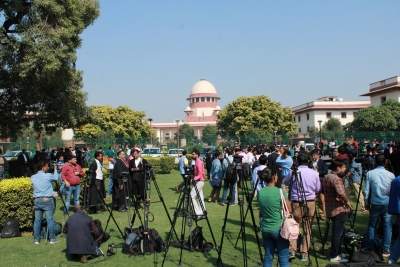Hindus’ evidence on better footing than Muslims, says SC

Photo: IANS
Photo: IANS
By IANS
New Delhi: The Supreme Court on Saturday held that the “possessory claim of the Hindus to the composite whole of the disputed property stands on a better footing than the evidence from the Muslims,” while emphasising on tolerance and mutual co-existence, which play a crucial role to nourish the secular commitment of the country and its people.
The apex court ordered the construction of a Ram temple at the disputed site by setting up a trust, while ordering five acres be given to Muslims in Ayodhya to construct a mosque.
The five-judge bench, headed by Chief Justice Ranjan Gogoi, observed the allotment of land to the Muslims is necessary “though on a balance of probabilities, the evidence in respect of the possessory claim of the Hindus to the composite whole of the disputed property stands on a better footing than the evidence adduced by the Muslims”.
The Supreme Court, in its ruling on Ayodhya, took account the balance of probabilities, where it saw clear evidence the worship by the Hindus in the outer courtyard continued unimpeded in spite of the setting up of a grille-brick wall in 1857.
“The Muslims have offered no evidence to indicate that they were in exclusive possession of the inner structure (the birthplace of Lord Ram) prior to 1857 since the date of the construction in the sixteenth century,” observed the court.
The Hindus’ possession of the outer courtyard stands established together with the incidents attaching to their control over it, it said.
The court observed in connection with the inner courtyard, there is evidence on a preponderance of probabilities to establish worship by the Hindus prior to the annexation of Oudh by the British in 1857.
The bench admitted that it is “is tasked with an adjudicatory task of unique dimension” and that the current dispute is over immovable property, and it does not decide title on the basis of faith or belief but on the basis of evidence.
“The law provides us with parameters as clear but as profound as ownership and possession. In deciding title to the disputed property, the court applies settled principles of evidence to adjudicate upon which party has established a claim to the immovable property,” it observed.
While awarding relief to the Muslim side, the court exercised its powers under Article 142 of the Constitution, as it admitted its responsibility to ensure that a wrong committed must be remedied.
“Justice would not prevail if the court were to overlook the entitlement of the Muslims who have been deprived of the structure of the mosque through means which should not have been employed in a secular nation committed to the rule of law,” said the court citing the Muslims were dispossessed upon the desecration of the mosque on December 22/23 1949 and it was ultimately destroyed on December 6, 1992.
The court observed it is necessary to provide restitution to the Muslim community for the unlawful destruction of their place of worship, and the court directed land measuring 5 acres be allotted to the Sunni Central Waqf Board either by the Central Government out of the acquired land or by the Government of Uttar Pradesh within the city of Ayodhya.




